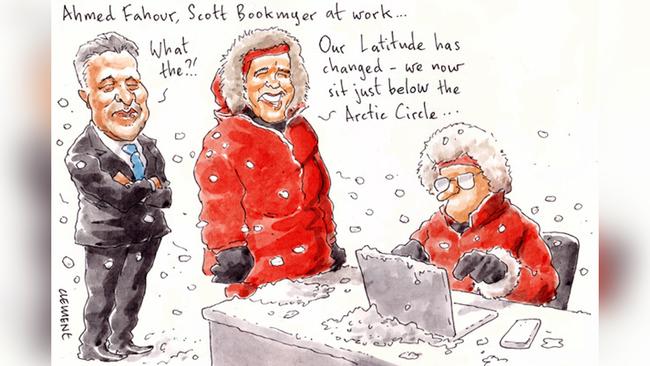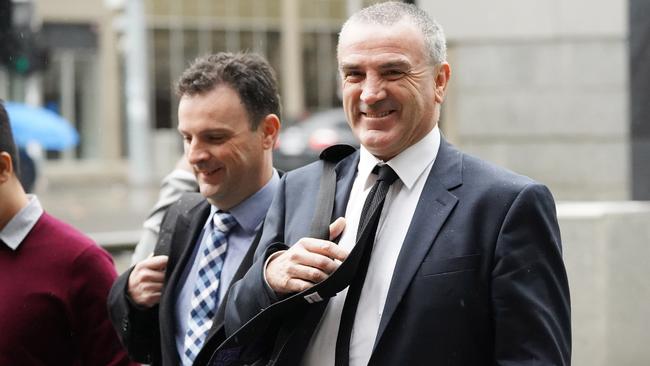Dover and out for Terry McMaster

Banned financial adviser Terry McMaster, forever remembered for his dramatic collapse in the witness box at the Hayne royal commission, has been quizzed on his own financial circumstances.
McMaster, who headed the Cheltenham-based Dover Financial Services, advised he’s down to his last $1000. And that he does not control the household family trust purse strings.
It was Bernard Quinn QC, legal counsel for the Australian Securities & Investments Commission, who elicited McMaster’s financial situation.

McMaster faces a pecuniary penalty after having been found to have engaged in misleading and deceptive conduct between September 2015 and March 2018 when dispensing financial advice to his 11,100 affected clients.
It was the first conviction to follow the royal commission, with the penalty hearing taking place this week after mediation failed.
McMaster advised he had $1000 in his personal bank account. However, he does see some income, McMaster told the Federal Court’s Justice Michael O’Bryan, who on Tuesday reserved judgment.
McMaster advised he had been able to cover his living costs by dipping in to the family trust, which is under the control of his wifeand son. It has equity in an accounting firm and a BlackRock investment property.
It provides about $1000-plus a month, but McMaster said he wasn’t controlling the distributions. “My wife made it very clear to me post-royal commission that she was in control of that trust,” he said.
“She did say that she would leave me if I didn’t accept that.
“My wife has told me very clearly, very clearly that I am not really allowed to do anything.”
His appearance at the commission in April 2018 saw him taken off on an ambulance stretcher to hospital after questioning by Mark Costello, counsel assisting the royal commission.
It was Costello who accused Dover, one of Australia’s largest non-bank financial planning networks prior to its collapse, of being “Orwellian” by describing its so-called client protection policy as a consumer protection mechanism.
The client protection policy, in reality, sought to limit the firm’s liability and the customer’s rights.
Dover ceased operating its financial services business in July 2018, and McMaster removed himself permanently from the financial services industry.
A lower Latitude
So much happened for the Ahmed Fahour-led consumer finance and insurance company Latitude Financial last year.
A failed attempt at a $3.2bn float, a strategic reset and now, Margin Call can reveal, a bottom-line loss of $12.1m in the year to December 31.
That’s a massive $40m deterioration in Latitude’s full-year bottom line, from a net profit of $27.6m the year before.
Nonetheless, The Australian revealed on Tuesday that the Deutsche Bank, KKR and Varde Partners-owned financial services group had just managed to land a fresh $1.4bn securitisation deal to support its operations.
Latitude’s audited accounts were signed off by director and KKR local boss Scott Bookmyer.
Former Aussie Post boss Fahour is not a director of the group’s parent entity.
The accounts for the Melbourne Docklands-headquartered group reveal that revenue in the year was virtually steady at $1.08bn, from $1.04bn the year before. The bottom line loss meant that no income tax was paid and shareholders were paid no dividends.
Fahour’s new strategy Latitude 2.0 is revealed to have cost $30m to execute, while the failed float cost the group $13m.
And there was also a jump of almost $10m in share-based payment reserve, recognising the fair value of management equity issued to participating employees in the year. Elsewhere, a massive jump in key management pay in the year was recorded, from $10.5m to $17.9m.
The accounts reveal that Fahour has also managed to renegotiate the terms around almost $700m in shareholder loans, with their repayment date extended from the end of November to May 2022.
Maybe a float will get away by then.
Carriage of funds
It’s a case of billionaires to the rescue of failed Sydney not-for-profit contemporary arts institution Carriageworks.
Leaping to the Everleigh organisation’s aid in its hour of financial need is a who’s who of Australian business identities, including billionaire fund manager Kerr Neilson, pokies heir Geoff Ainsworth and his wife Johanna Featherstone, billionaire gaming siblings Gretel and James Packer and ANZ chair and corporate adviser David Gonski.
That’s what you might call a gaming-led rescue.
Directors led by chair and corporate adviser Cass O’Connor have proposed a deed of company arrangement that will result in $1.65m being poured into the arts organisation, which was plunged into administration on May 4 after its operations were decimated by the COVID-19 shutdown.
The deed is funded by pledges and loans from the high-profile benefactors, who have also committed to chip in a further $1.3m outside the deed should it need even more money.
Ainsworth, who is on the Carriageworks board, is the son of billionaire pokie king Len Ainsworth. Under the DOCA, the scion’s Oranges and Sardines Foundation will lend $900,000, as well as donate a further $200,000. Outside of the DOCA, the foundation will lend a further $900,000 if required.
Neilson’s foundation has pledged $500,000 under the DOCA, while the Gonski Foundation will give $50,000. Gonski’s lawyer son Michael Gonski, who is a partner at Herbert Smith Freehills, is also on the Carriageworks board. The family’s charitable outfit has also offered a further $150,000 outside the DOCA should it be needed.
The Packers, meanwhile, will not participate in the DOCA, but have promised $240,000 over the next two years in funding that is tied to a specific indigenous program at the institution called Solid Ground.
Carriageworks creditors will gather (virtually) again next Tuesday, when they will be asked to vote on the deed, the acceptance of which administrators have recommended.
Scrum caught short
As Rugby Australia staff are hit with mass redundancies at Moore Park, ongoing frustrations are being aired over the dismal performance of the board. The latest annual report reveals its second-longest-serving non-executive board member, Pip Marlow, hasn’t exactly been a regular attendee as the crisis unfolded throughout last year.
In fact, she only turned up to half the meetings of rugby’s governing body.
Yes 18 meetings is way too many during a year, but Marlow only got to the boardroom table nine times.
While no dates are advised, Margin Call gleans that 15 of the board meetings were held in the last eight months of 2019.
Marlow, who developed her passion for the game as a New Zealander, joined the board in 2016 just as Cameron Clyne became chairman.
She has been settling in as the chief executive of the Darling Park-based software giant Salesforce ANZ since August last year. For the two prior years she was at Suncorp, and before that six years as Microsoft Australia chief executive, having been with the tech giant since 1995.
The Palmerston North-born Marlow, mother of two Mosman daughters, will soon be the longest-serving board member when its interim chairman Paul McLean heads off later this month to be replaced by Hamish McLennan at its next meeting on June 15. McLean, the Wallaby hall of fame member, has been on the board since 2013.
Paper and pulp industry veteran Hayden Rorke, the former president of Gordon Rugby Football Club, attended all 18 meetings, having been appointed in 2018.
The board presided over a $9.4m deficit.



To join the conversation, please log in. Don't have an account? Register
Join the conversation, you are commenting as Logout